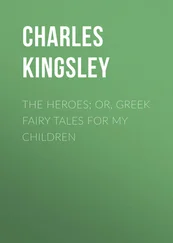Charles Kingsley - The Good News of God
Здесь есть возможность читать онлайн «Charles Kingsley - The Good News of God» — ознакомительный отрывок электронной книги совершенно бесплатно, а после прочтения отрывка купить полную версию. В некоторых случаях можно слушать аудио, скачать через торрент в формате fb2 и присутствует краткое содержание. Жанр: foreign_prose, foreign_religion, Философия, foreign_psychology, foreign_antique, на английском языке. Описание произведения, (предисловие) а так же отзывы посетителей доступны на портале библиотеки ЛибКат.
- Название:The Good News of God
- Автор:
- Жанр:
- Год:неизвестен
- ISBN:нет данных
- Рейтинг книги:4 / 5. Голосов: 1
-
Избранное:Добавить в избранное
- Отзывы:
-
Ваша оценка:
- 80
- 1
- 2
- 3
- 4
- 5
The Good News of God: краткое содержание, описание и аннотация
Предлагаем к чтению аннотацию, описание, краткое содержание или предисловие (зависит от того, что написал сам автор книги «The Good News of God»). Если вы не нашли необходимую информацию о книге — напишите в комментариях, мы постараемся отыскать её.
The Good News of God — читать онлайн ознакомительный отрывок
Ниже представлен текст книги, разбитый по страницам. Система сохранения места последней прочитанной страницы, позволяет с удобством читать онлайн бесплатно книгу «The Good News of God», без необходимости каждый раз заново искать на чём Вы остановились. Поставьте закладку, и сможете в любой момент перейти на страницу, на которой закончили чтение.
Интервал:
Закладка:
We should not dare; and for two reasons.
First—There is a notion abroad, borrowed from the old monks, that this earth is in some way bad, and cursed; that a curse is on it still for man’s sake: but a notion which is contrary to plain fact; for if we till the ground, it does not bring forth thorns and thistles to us, as the Scripture says it was to do for Adam, but wholesome food, and rich returns for our labour: and which in the next place is flatly contrary to Scripture: for we read in Genesis viii. 21, how the Lord said, ‘I will not again curse the ground any more for man’s sake;’ and the Psalms always speak of this earth, and of all created things, as if there was no curse at all on them; saying that ‘all things serve God, and continue as they were at the beginning,’ and that ‘He has given them a law which cannot be broken;’ and in the face of those words, let who will talk of the earth being cursed, I will not; and you shall not, if I can help it.
Another reason why we dare not talk of this earth as this hymn does is, that we have got into the habit of saying, ‘Cattle and creeping things—they are not rational beings. How can they praise God? Clouds and wells—they are not even living things. How can they praise God? Why speak of them in a hymn; much less speak to them?’
Yet this hymn does speak to them; and so do the Psalms and the Prophets again and again. And so will men do hereafter, when the fashions and the fancies of these days are past, and men have their eyes opened once more to see the glory which is around them from their cradle to their grave, and hear once more ‘The Word of the Lord walking among the trees of the garden.’
But how can this be? How can not only dumb things, but even dead things, praise God?
My friends, this is a great mystery, of which the wisest men as yet know but little, and confess freely how little they know. But this at least we know already, and can say boldly—all things praise God, by fulfilling the law which our Lord himself declared, when he said ‘Not every one who saith to me, Lord, Lord, shall enter into the kingdom of heaven: but he that doeth the will of my Father who is in heaven.’
By doing the will of the heavenly Father. By obeying the laws which God has given them. By taking the shape which he has appointed for them. By being of the use for which he intended them. By multiplying each after their kind, by laws and means a thousand times more strange than any signs and wonders of which man can fancy for himself; and by thus showing forth God’s boundless wisdom, goodness, love, and tender care of all which he has made.
Yes, my friends, in this sense (and this is the true sense) all things can serve and praise God, and all things do serve and praise Him. Not a cloud which fleets across the sky, not a clod of earth which crumbles under the frost, not a blade of grass which breaks through the snow in spring, not a dead leaf which falls to the earth in autumn, but is doing God’s work, and showing forth God’s glory. Not a tiny insect, too small to be seen by human eyes without the help of a microscope, but is as fearfully and wonderfully made as you and me, and has its proper food, habitation, work, appointed for it, and not in vain. Nothing is idle, nothing is wasted, nothing goes wrong, in this wondrous world of God. The very scum upon the standing pool, which seems mere dirt and dust, is all alive, peopled by millions of creatures, each full of beauty, full of use, obeying laws of God too deep for us to do aught but dimly guess at them; and as men see deeper and deeper into the mystery of God’s creation, they find in the commonest things about them wonder and glory, such as eye hath not seen, nor ear heard, nor hath it entered into the heart of man to conceive; and can only say with the Psalmist, ‘Oh Lord, thy ways are infinite, thy thoughts are very deep;’ and confess that the grass beneath their feet, the clouds above their heads—ay, every worm beneath the sod and bird upon the bough, do, in very deed and truth, bless the Lord who made them, praise him, and magnify him for ever, not with words indeed, but with works; and say to man all day long, ‘Go thou, and do likewise.’
Yes, my friends, let us go and do likewise. If we wish really to obey the lesson of the Hymn of the Three Children, let us do the will of God: and so worship him in spirit and in truth. Do not fancy, as too many do, that thou canst praise God by singing hymns to him in church once a week, and disobeying him all the week long, crying to him ‘Lord, Lord,’ and then living as if he were not thy Lord, but thou wast thine own Lord, and hadst a right to do thine own will, and not his. If thou wilt really bless God, then try to live his blessed life of Goodness. If thou wilt truly praise God, then behave as if God was praiseworthy, good, and right in what he bids thee do. If thou wouldest really magnify God, and declare his greatness, then behave as if he were indeed the Great God, who ought to be obeyed—ay, who must be obeyed; for his commandment is life, and it alone, to thee, as well as to all which He has made. Dost thou fancy as the heathen do, that God needs to be flattered with fine words? or that thou wilt be heard for thy much speaking, and thy vain repetitions? He asks of thee works, as well as words; and more, He asks of thee works first, and words after. And better it is to praise him truly by works without words, than falsely by words without works.
Cry, if thou wilt, ‘Holy, Holy, Holy, Lord God of hosts;’ but show that thou believest him to be holy, by being holy thyself. Sing, if Thou wilt, of ‘The Father of an Infinite Majesty:’ but show that thou believest his majesty to be infinite, by obeying his commandments, like those Three Children, let them cost thee what they may. Join, and join freely, in the songs of the heavenly host; for God has given thee reason and speech, after the likeness of his only begotten Son, and thou mayest use them, as well as every other gift, in the service of thy Father. But take care lest, while thou art trying to copy the angels, thou art not even as righteous as the beasts of the field. For they bless and praise God by obeying his laws; and till thou dost that, and obeyest God’s laws likewise, thou art not as good as the grass beneath thy feet.
For after all has been said and sung, my friends, the sum and substance of true religion remains what it was, and what it will be for ever; and lies in this one word, ‘If ye love me, keep my commandments.’
SERMON V
THE ETERNAL GOODNESS
Thou shalt love thy neighbour as thyself.
Why are wrong things wrong? Why, for instance, is it wrong to steal?
Because God has forbidden it, you may answer. But is it so? Whatsoever God forbids must be wrong. But, is it wrong because God forbids it, or does God forbid it because it is wrong?
For instance, suppose that God had not forbidden us to steal, would it be right then to steal, or at least, not wrong?
We must really think of this. It is no mere question of words, it is a solemn practical question, which has to do with our every-day conduct, and yet which goes down to the deepest of all matters, even to the depths of God himself.
The question is simply this. Did God, who made all things, make right and wrong? Many people think so. They think that God made goodness. But how can that be? For if God made goodness, there could have been no goodness before God made it. That is clear. But God was always good, good from all eternity. But how could that be? How could God be good, before there was any goodness made? That notion will not do then. And all we can say is that goodness is eternal and everlasting, just as God is: because God was and is and ever will be eternally and always good.
Читать дальшеИнтервал:
Закладка:
Похожие книги на «The Good News of God»
Представляем Вашему вниманию похожие книги на «The Good News of God» списком для выбора. Мы отобрали схожую по названию и смыслу литературу в надежде предоставить читателям больше вариантов отыскать новые, интересные, ещё непрочитанные произведения.
Обсуждение, отзывы о книге «The Good News of God» и просто собственные мнения читателей. Оставьте ваши комментарии, напишите, что Вы думаете о произведении, его смысле или главных героях. Укажите что конкретно понравилось, а что нет, и почему Вы так считаете.












